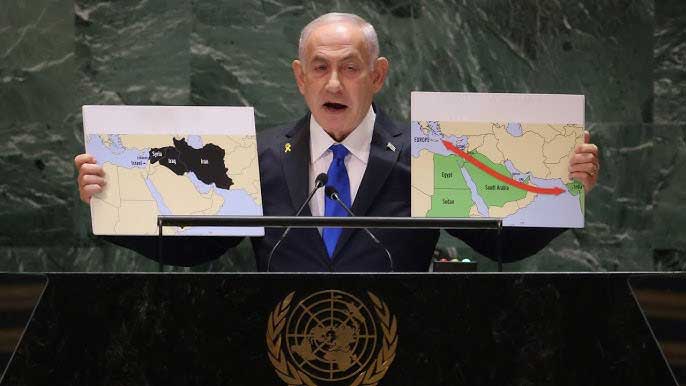The United States and Israel: Two Sides of the Same Coin in the Quest for Dominance over Middle Eastern Transit and Energy!
Sea News – Analysis: Recent remarks by Ali Akbar Salehi, former Minister of Foreign Affairs and former head of the Atomic Energy Organization of Iran, about U.S. policies aimed at transforming Israel into the Middle East’s regional hub have once again fueled critiques of regional countries’ dependency on an extra-regional power. This project unfolds as the U.S. seeks to strengthen regional dependence on its military and economic presence by creating an energy, technology, and transportation hegemony through Israel—a move that could have concerning consequences for Iran’s neighboring countries.
Undermining Regional Independence by Increasing Dependence on Israel
Using Israel as a regional hub for energy and transit is part of the U.S.’s long-term strategy to reshape energy routes. By channeling energy transit through Israel to Europe and other regions, the U.S. is steering Middle Eastern countries toward dependency on these routes. In other words, if Arab and Gulf oil and gas pass through Israel, they would be subject to U.S. and Israeli policies, potentially diminishing regional countries’ economic independence and decision-making power in energy supply.
This dependency would serve as a powerful political and economic leverage for both Israel and the U.S. Regional countries—including major energy producers and large consumers such as Turkey and even some European nations—would have to adapt to Israel’s imposed conditions to access energy sources, limiting their flexibility and bargaining power.
Weakening Regional Cohesion
The U.S. strategy to concentrate energy and technology in Israel implicitly weakens the potential for Middle Eastern countries to come together. Countries in the region that could gain greater independence through joint energy and transit cooperation may find fewer incentives for collaboration if they rely on Israel as a hub. For example, joint initiatives between Iran and its neighbors in gas and oil transportation might face obstacles or even be halted due to Israel’s influence over regional transit networks.
Strengthening U.S. Military Presence by Controlling Vital Waterways
Under this policy, the U.S., by investing in Israel’s maritime and energy projects, aims to gain further control over vital Middle Eastern waterways. The U.S. military and naval presence in areas such as the Mediterranean Sea, the Red Sea, and the Sea of Oman allows the U.S. to secure the region’s stability according to its own interests. This presence potentially threatens the security and stability of neighboring countries, as the U.S. could use these routes for political and economic pressure at any time.
Marginalizing Regional Countries and Economic Instability
The U.S. policy of strengthening Israel’s infrastructure reduces the economic and political significance of some regional countries, providing a means to bypass and weaken them. This restructuring of energy transit routes naturally increases regional dependency on Israel and the U.S. Countries may find themselves needing to go through Israeli-controlled routes even to access their own resources.
Additionally, this policy could lead to reduced revenues and increased dependence on foreign transit routes, causing significant economic fluctuations within the region. Governments, faced with lower revenues and rising resource management costs, may struggle to provide adequate public services and welfare for their people, potentially leading to social discontent, protests, and in some cases, internal political crises.
Instrumentalizing Israel in Global Rivalries
By expanding Israel’s role as a hub for energy and technology in the Middle East, the U.S. turns Israel into a tool to advance its global policies. This strategy not only affects regional security but also transforms Israel into part of a larger geopolitical game, which could lead to heightened tensions and internal instability in the Middle East.
One of the U.S.’s goals in using Israel as a tool is to limit the influence of China, Russia, and Iran in the Middle East. China, with its significant investments in projects like the “Belt and Road Initiative,” Russia, with its military and economic influence, and Iran, with its strengthening relations with regional countries, are seen as major threats to U.S. interests in the region. Through Israel’s extensive security and intelligence cooperation with the U.S. and its restrained relations with China, Russia, and Iran, the U.S. can resist its rivals’ influence. Particularly in technology and intelligence, Israel plays a crucial role in transferring sensitive regional data and information to the U.S., preventing China, Russia, and Iran from accessing strategic information and infrastructure in the Middle East.
Another dimension of using Israel as a tool involves pushing regional countries to adopt Western policies. By bolstering Israel’s role as an economic and security center, the U.S. encourages Arab countries and other neighbors to cooperate with Israel and accept U.S. policies. This approach has peaked following the normalization agreements between Israel and some Arab states, like the United Arab Emirates and Bahrain. This trend deters regional countries from pursuing cooperation with U.S. rivals and aligns them with Western policies.
For example, the recent statement from the Gulf Cooperation Council (GCC) and the European Union, deeming Iran’s sovereignty over the three islands illegal, exemplifies this kind of policy aimed at controlling the region and creating divisions among Middle Eastern countries.
Looking Forward: Regional Cooperation as a Solution
Considering these challenges, regional countries should focus on regional cooperation and emphasize their internal capacities to create independent energy and transit networks. Only through such efforts can they resist external pressures and build a sustainable and independent future.

